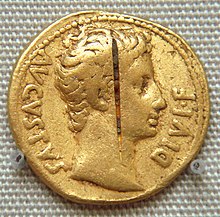Augustus' public
revenue reforms had a great impact on the subsequent success of the Empire. Augustus brought a far greater portion of the Empire's expanded land base under consistent, direct taxation from Rome, instead of exacting varying, intermittent, and somewhat arbitrary tributes from each local province as Augustus' predecessors had done.
This reform greatly increased Rome's net revenue from its territorial acquisitions, stabilized its flow, and regularized the financial relationship between Rome and the provinces, rather than provoking fresh resentments with each new arbitrary exaction of tribute.
The measures of taxation in the reign of Augustus were determined by population
census, with fixed quotas for each province.
Citizens of Rome and Italy paid indirect taxes, while direct taxes were exacted from the provinces.
Indirect taxes included a 4% tax on the price of slaves, a 1% tax on goods sold at auction, and a 5% tax on the inheritance of estates valued at over 100,000 sesterces by persons other than the
next of kin.
An equally important reform was the abolition of private
tax farming, which was replaced by salaried civil service tax collectors. Private contractors that raised taxes had been the norm in the Republican era, and some had grown powerful enough to influence the amount of votes for politicians in Rome.
The tax farmers had gained great infamy for their depredations, as well as great private wealth, by winning the right to tax local areas.
Rome's revenue was the amount of the successful bids, and the tax farmers' profits consisted of any additional amounts they could forcibly wring from the populace with Rome's blessing. Lack of effective supervision, combined with tax farmers' desire to maximize their profits, had produced a system of arbitrary exactions that was often barbarously cruel to taxpayers, widely (and accurately) perceived as unfair, and very harmful to investment and the economy.

Coin of the
Himyarite Kingdom, southern coast of the
Arabian peninsula. This is also an imitation of a coin of Augustus. 1st century
The use of
Egypt's immense land rents to finance the Empire's operations resulted from Augustus' conquest of Egypt and the shift to a Roman form of government.
As it was effectively considered Augustus' private property rather than a province of the Empire, it became part of each succeeding emperor's patrimonium.
Instead of a legate or proconsul, Augustus installed a prefect from the equestrian class to administer Egypt and maintain its lucrative seaports; this position became the highest political achievement for any equestrian besides becoming
Prefect of the Praetorian Guard.
The highly productive agricultural land of Egypt yielded enormous revenues that were available to Augustus and his successors to pay for public works and military expeditions,
as well as bread and circuses for the population of Rome.



0 comments:
Post a Comment